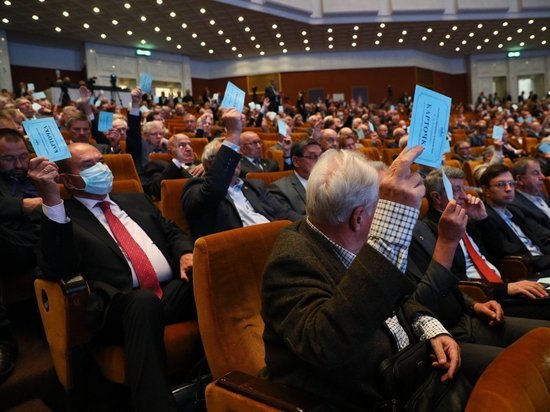At the presentation of the members of the Presidium of the Russian Academy of Sciences, they again started talking about black PR
[ad_1]

The topic was raised by Academician-Secretary of the Department of Physical Sciences
The new Presidium of the Russian Academy of Sciences was approved on Thursday evening, September 22, at the General Meeting of the Russian Academy of Sciences. Its number, including the president, vice-presidents, academic secretaries, scientific secretary and members of the Presidium, amounted to 82 people.
The election of vice-presidents, whose candidacies were presented by the President of the Russian Academy of Sciences Gennady Krasnikov, was carried out by secret ballot. So, the closest assistants to the head of the Academy for the next five years were academicians: Sergey Aldoshin (scientific director of the Federal Research Center for Problems of Chemical Physics and Medical Chemistry of the Russian Academy of Sciences), Nikolai Dolgushkin (adviser to the Russian Academy of Sciences), Valentin Parmon (chairman of the Siberian Branch of the Russian Academy of Sciences), Stepan Kalmykov (Dean of the Faculty of Chemistry, Lomonosov Moscow State University), Yuri Kulchin (Scientific Director of the Institute of Automation and Control Processes, Far Eastern Branch of the Russian Academy of Sciences), Nikolai Makarov (Director of the Institute of Archeology of the Russian Academy of Sciences), Vladislav Panchenko (Vice President of the National Research Center “Kurchatov Institute”) , Mikhail Piradov (Director of the Federal State Budgetary Scientific Institution “Scientific Center of Neurology”), Viktor Rudenko (Chairman of the Ural Branch of the Russian Academy of Sciences) and Sergey Chernyshev (Director of the Central Aerohydrodynamic Institute named after Professor N.E. Zhukovsky). Many of the dozens of vice-premiers took up this honorary position for the first time, and some did not have to leave, like Nikolai Makarov, who had previously been in the team of the previous head of the Russian Academy of Sciences Alexander Sergeyev.
Valentin Parmon and Viktor Rudenko will also have to combine the positions of chairmen of regional departments with the vice presidency, while Vladislav Panchenko has taken on as many as three positions: vice president, academic secretary of the Department of Nanotechnology and Information Technology and head of the new Russian Center for Scientific Information (RTsNI), which was formed this summer on the basis of the RFBR. There were rumors that someone from the Ministry of Education and Science would replace him in this post, but so far they have not been confirmed.
In addition to vice-presidents, the academicians elected academic secretaries of thematic departments, members of the Presidium and the chief scientific secretary of the Presidium. The last was Academician Mikhail Dubina, a specialist in the field of molecular genetic technologies and nanobiotechnologies. From 2011 to 2017, he worked as head of the nanobiotechnology laboratory at the St. Petersburg National Research Academic University of the Russian Academy of Sciences, led by Nobel laureate Zhores Alferov. To date, Mikhail Vladimirovich is the acting director of the State Research Institute of Highly Pure Biopreparations of the Federal Medical and Biological Agency of Russia.
When all the key names were named, and the academicians were about to disperse, the elected Academician-Secretary of the Department of Physical Sciences, Vitaly Kveder, unexpectedly asked for the floor. He proposed to include in the decision of the General Assembly of the Russian Academy of Sciences a text on the unacceptability of using “black PR” and the use of administrative resources in the election campaign, which took place.
Gennady Krasnikov agreed with Kveder, saying that he had never seen anything like this since 1997, when he came to the Academy. The President of the Russian Academy of Sciences proposed to consider in more detail the appeal of physicists at the next meeting of the Presidium of the Russian Academy of Sciences: “We must do everything possible to eradicate things that are unusual for the academic style in the future.”
[ad_2]
Source link








